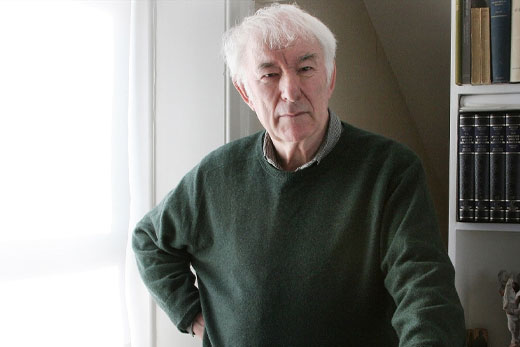Nobel Prize-winning poet Seamus Heaney will visit the Emory University campus for a free public reading on Saturday, March 2.
The acclaimed and enormously popular Irish poet will read at 2 p.m. at Glenn Auditorium. Because seating is limited, tickets are required for the free event and can be obtained beginning Wednesday, Feb. 6 through the Schwartz Center for the Performing Arts box office. (See our fact box for more information.)
A limited number of tickets also are available at four local independent bookstores: A Cappella Books, Charis Books and More, Eagle Eye Book Shop and Little Shop of Stories. Tickets (limit two tickets per person) must be picked up in person at these locations.
Heaney also will be revisiting his collection at Emory. In 2003, Emory’s Manuscript, Archives, and Rare Book Library (MARBL) acquired a significant portion of Heaney’s papers, composed of manuscripts, photos, recordings of readings and lectures, and personal and literary correspondence that includes insightful exchanges with many poets whose papers are also housed at MARBL. The collection will be the subject of a major exhibition in spring 2014, curated by Geraldine Higgins, associate professor of English and director of the Irish Studies program at Emory.
Heaney the poet
Heaney won the Nobel Prize in Literature in 1995, and he recently received the Griffin Trust for Excellence in Poetry’s 2012 Lifetime Recognition Award. His other prestigious awards include the T.S. Eliot Prize, the E.M. Forster Award, the Geoffrey Faber Memorial Prize, and the Truman Capote Award for Literary Criticism.
Among his many volumes of poetry are the prize-winning “Death of a Naturalist” (1966), “North” (1975), “Seeing Things” (1991), “The Spirit Level” (1996), “District and Circle” (2006) and “Human Chain” (2010).
Evolution as an artist
“Over the course of his career, Heaney’s poetry has something for every stage of life,” Higgins says. In his early volumes, Heaney often wrote about the rural landscape of his native Northern Ireland and the fading of the traditional way of farming life. “The reader becomes drawn in by a poem like ‘Digging’ that explores Heaney’s own roots and heritage,” says Higgins, “It introduces an archaeological theme, accessible but multi-layered, that is vital to his work as you move through it.”
In later volumes, Heaney addresses the violence in contemporary Irish life; the controversial “North” was inspired by photographs of the Iron Age bodies found in the bogs of Denmark that served as a metaphor for the Troubles in the North of Ireland. His translation of the epic poem “Beowulf” (1999) from Old English to Modern English was unexpectedly popular and helped bring the story to life for a new generation.
Heaney’s friend, Ronald Schuchard, Emory English professor and faculty advisor to MARBL, says Heaney’s readings are engaging and humorous, his demeanor relaxed and personable as he talks about the poems and tells stories. “He’s there to entertain the audience and make it kind of a communal event,” Schuchard says. “People sit on the edge of their seats, they’re so enthralled.”
“He has this incredible warmth,” Higgins says. “Whether you go as a complete novice about his poetry or you go with a deep understanding of his work, you come away completely engaged and transformed by the experience of hearing him read.”
Heaney and Emory
Heaney has an affinity for Emory that goes back to his first reading at the university in March 1981, Schuchard says. Heaney conducted readings and poetry workshops at Emory throughout the 1980s and 1990s.
In 1988, he delivered the inaugural Richard Ellmann lecture and donated his lecture notes to Special Collections (now MARBL), what Schuchard calls “a momentous event.” The manuscript and archive library had started in 1979 with the purchase of a W.B. Yeats collection and had continued building on early 20th century Irish writers, but Heaney’s donation was a turning point.
“When Heaney gave us those papers in 1988, it catapulted the collecting into the contemporary period, and that led to the growth of the Irish collection that’s so fabulous now,” Schuchard says.
Heaney revisited Emory in May 2003 to give the commencement address and receive an honorary degree. He returned in September 2003 for a poetry reading and to place his letters with Special Collections in honor of his friend, retiring Emory president Bill Chace.
“In Seamus Heaney’s writings and in his enduring connection with Emory and especially with MARBL, we see expression of essential values such as truth, wisdom, insight and friendship,” says Rosemary Magee, director of MARBL. “It is a true pleasure and an honor to welcome him back into our midst.”
About Heaney
The eldest of nine children, Heaney was born in 1939 at the family farm, Mossbawn, about 30 miles northwest of Belfast in County Derry. He earned a degree in English in 1961 from Queens University in Belfast and followed that with a postgraduate teaching diploma at St. Joseph’s College in Belfast. He taught at Queens University and other colleges and universities, while publishing original volumes and collections of his poetry and prose.
Heaney also taught at Harvard, beginning as a visiting professor in the early 1980s and becoming a full professor in the mid ‘80s. He maintained that post while teaching at the University of Oxford from 1989 to 1994. He was the Ralph Waldo Emerson Writer-in-Residence at Harvard from 1996-2006. He lives in Dublin, Ireland.
About the reading
Books will be sold at the March 2 reading, but no signing will be held. Heaney’s reading is part of the Raymond Danowski Poetry Library Reading Series. The reading is sponsored by Emory Libraries, MARBL, the Creative Writing Program at Emory, and the Hightower Fund.
Glenn Auditorium is located at 1652 N. Decatur Rd., Atlanta, GA 30322. Parking is available in the Fishburne and Oxford Road decks.

